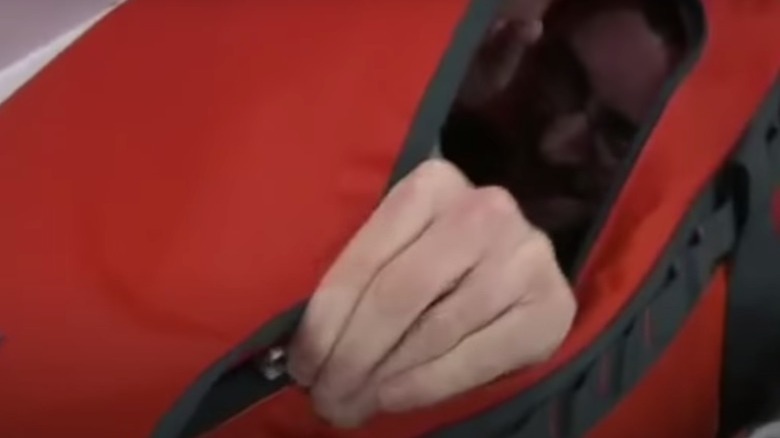What Was Found At British Codebreaker Gareth Williams' Crime Scene
Back in 2010, the British media reported one of the most intriguing potential murder stories in recent memory. The strange death of 31-year-old codebreaker Gareth Williams is still being investigated even today.
Born in Wales, Williams was a math prodigy whose vast intelligence and ability as a logician saw him studying for a Ph.D. at the tender age of 18, according to The Guardian, which reports that Williams was also a highly respected online gamer whose skills drew the attention of the British intelligence services. At 21, Williams had been recruited into the Government Communications Headquarters, typically referred to as GCHQ, the U.K.'s "intelligence, security and cyber agency," where he became a respected analyst and technician working on projects related to the ongoing War on Terror and security threats from foreign nations. Russia was a particular focus (via Buzzfeed News), though he could not discuss the exact nature of his work with his family. For 10 years, Williams worked diligently and obsessively, living a simple existence with little socialization, preferring instead to spend what little spare time he had cycling competitively. For the last few years of his life, he was working at MI6, the U.K.'s Secret Intelligence Service.
On August 23, 2010, Williams' body was discovered at his apartment by police officers who were investigating his disappearance. He was found in a state of decomposition, inside an airtight holdall bag, which in turn was set in his apartment's bathtub, his naked body tightly contorted. How had Williams died in such an unusual way? Scouring the apartment for clues, investigators sought to find out.
Williams' body in a bag in the bathtub
Williams had been missing for days by the time his body was discovered in his London apartment. For some, the fact that his body was placed in an airtight bag in the codebreaker's own bathtub was evidence of a professional killing, as the bag would mask the smell of decomposition, while any liquids escaping the body would run down the plughole, again minimizing the smell and reducing the chance that the body would be discovered in time to conduct an adequate forensic examination (via The Guardian).
As another Guardian article reports, Williams' death would have been treated as undoubted murder if not for one small biographical detail revealed to investigators by the codebreaker's landlady, who said that a few years before his death, she had heard yells coming from Williams' apartment. Upon entering, she discovered Williams tied to his bed, unable to free himself. Similarly, it was reported that investigators looking into Williams' sexual history had found evidence that he had accessed sadomasochistic pornography on his computer. Had Williams, who in the months following his death was characterized by the British media as a bondage enthusiast and claustrophiliac, got himself into the holdall and been unable to get out? Or had someone else been involved?
As noted by an investigator interviewed by CNN, another detail of the crime scene was that the bag had "scuffed" the side of the bathtub as it was being put into it, suggesting it was carrying weight — i.e. the weight of Williams himself — as it was being placed into the position in which the police found it.
A lock and zip free from DNA
The question now was whether the grisly find was the result of a sexual misadventure, either attempted by the codebreaker alone or with another person present — as some had speculated — or whether Williams had been the target of a professional assassination as a result of his intelligence work.
Examination of the crime scene seemed to suggest that the version of events in which Williams had died as a result of a sex act committed entirely alone ought to be ruled out. Per CNN, though London's Metropolitan Police investigators announced that they had found no evidence that any other person had been involved in Williams' death, testimony by "confined spaces expert" Peter Faulding undermined their report. Though Faulding demonstrated that Williams could indeed have zipped himself into the bag — which was also padlocked from the outside — the codebreaker's DNA was discovered neither on the padlock nor the exterior of the zipper, and there were no handprints to be found on the bathtub itself. "We can zip ourselves in the bag ... but you can't do it without leaving a trace [of DNA]," Faulding said, adding that Williams' death seemed to him the "perfect crime."
No evidence of a struggle or poisoning
The rest of Williams' London home was in pristine condition when police officers entered the apartment and discovered his body, according to The Guardian. His possessions included his mobile phone and laptop, a woman's wig, and luxury women's clothes that Williams was believed to have enjoyed wearing.
Another source of frustration regarding the investigation has been the lack of credible analysis regarding the presence of any potentially killer substances in Williams' system at the time of his death. As reported by The Guardian, Williams' body was in such a severe state of decomposition by the time it was discovered that toxicology reports came back "inconclusive," with an expert involved in the case explaining, "If we don't know what to look for, and are not guided by what we see or smell on the body, we cannot find it ... in the absence of a specific direction, the possibilities are as limitless as a killer's imagination ... and we cannot test for that."
Nevertheless, more details have emerged over the years that suggest Williams' death was orchestrated. As reported in the Daily Post, in October 2022, Norman Baker, a former British Member of Parliament who was in government in 2010, and an ex-KGB agent named Boris Karpichkov, who has lived in the U.K. since 1998, have claimed that Williams was indeed murdered by Russian assassins — likely with an obscure poison — as a result of an investigation Williams was involved in which threatened to uncover a Russian spy working as a mole in British intelligence. They also claimed that Williams was investigating Russian money laundering.



